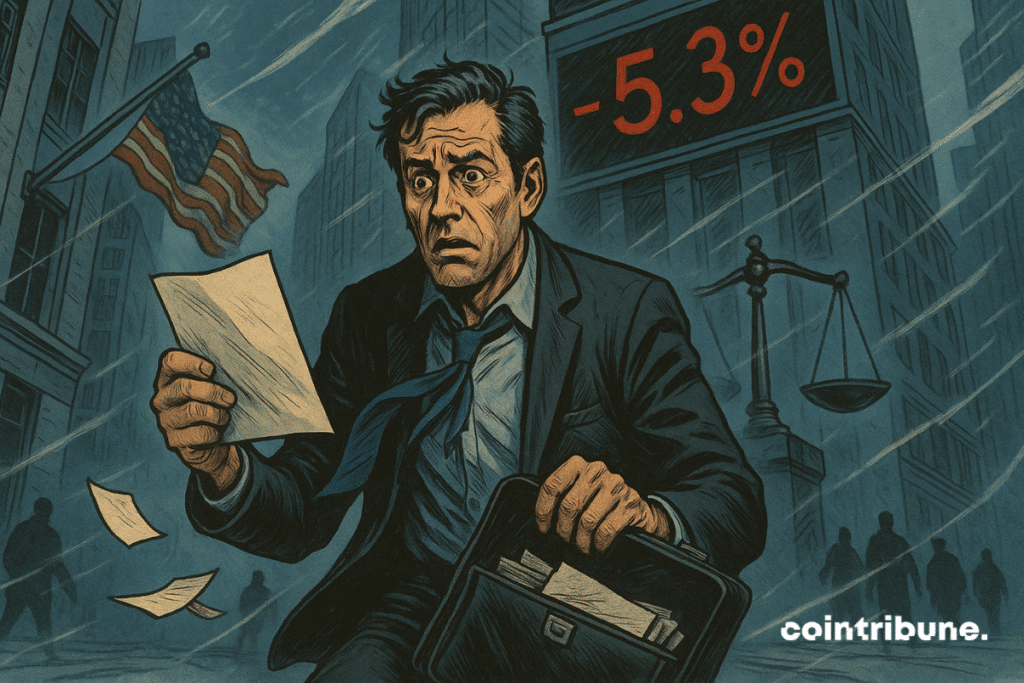Global Markets Shaken by US Tariffs and Rising Unemployment
The already fragile balance of the global economy has just taken another hit. On August 1st, Donald Trump signed a decree imposing heavy tariffs on seventy countries, with enforcement scheduled for August 7. This announcement immediately shook the financial markets, amplifying tensions against a backdrop of global instability. Behind this trade offensive lies a clear protectionist strategy, with potentially massive consequences for international trade, diplomatic relations, and the economic trajectory in the coming months.

In Brief
- Donald Trump signs a decree imposing new tariffs on 70 countries, with implementation scheduled for August 7.
- This announcement triggers an immediate drop in major global stock exchanges, especially in Paris, Frankfurt, and Seoul.
- Markets react violently to economic uncertainty, amid a context already weakened by unemployment in the United States.
- These new tariff measures exacerbate international trade imbalances and rekindle fears of deglobalization.
A Dark Day for Stock Markets
While the EU and the United States have allied around tariffs, the signing of a decree imposing new tariffs by US President Donald Trump immediately shook global markets. These taxes, targeting 70 trade partners at rates from 10% to 41%, are intended to “restructure global trade to the benefit of American workers”.
Although their entry into force is postponed to August 7, their mere announcement triggered instability in the major global financial centers. At the Wall Street stock exchange, futures contracts on the three main indices signaled a sharp opening drop, reflecting widespread investor concern about this protectionist direction.
In Europe and Asia, stock markets immediately reacted with declines from the opening of the trading session on Friday morning. Here are the main changes observed at midday:
- Paris: -2.17%;
- Frankfurt: -1.85%;
- Milan: -1.86%;
- London: -0.60%;
- Seoul: -3.88%;
- China and Japan: moderate declines.
Pharmaceutical stocks and large export-exposed groups were among the most affected in the stock market. In the short term, this instability fuels marked nervousness in markets, driven by the unpredictability of American decisions. Investors remain in suspense, especially as several affected states are still trying urgently to negotiate exemptions before the August 7 deadline.
Diplomacy Under Strain
Faced with this unprecedented tariff wave, the targeted countries’ reactions were swift. Several governments expressed disapproval or requested adjustments. China, engaged in a trade truce with the United States running until August 12, firmly condemned what it called “protectionism that harms all parties”.
Canada, on its side, was informed that its tariffs would increase from 25% to 35% as of August 1st, except for products covered by the North American Free Trade Agreement. A sanction that, according to Donald Trump, results from Ottawa’s intention to “recognize the State of Palestine”, a decision deemed incompatible with American trade interests. Brazil saw its exports targeted at 50% in reaction to legal proceedings against former president Jair Bolsonaro, regarded as a strategic ally by Washington.
In other regions, governments are trying to buy time or negotiate exemptions. Mexico thus obtained a 90-day reprieve before the possible implementation of tariff increases. In South Africa, the 30% tariffs imposed by the United States are said by the local central bank to threaten up to 100,000 jobs.
Its president, Cyril Ramaphosa, mentioned “intensive negotiations” to mitigate the effects. Taiwan, hit at 20% despite the strategic importance of its semiconductor industry, indicated it would “strive to obtain a reasonable level of tariffs”. Switzerland, meanwhile, was struck by an unexpected surcharge of 39%, well beyond the threshold applied to the European Union, causing its government consternation, which continues to “seek a negotiated solution”, despite its “great regret”.
In this climate of growing mistrust towards traditional assets, certain safe havens regain a central role. Bitcoin, in particular, sees its appeal strengthened among investors looking for alternatives disconnected from national monetary policies. The crypto market, often seen as an arbitrage asset in times of turbulence, could benefit from a new wave of interest if geopolitical and economic tensions worsen.
These measures further fragment international trade balances, with potentially lasting consequences. In the short term, they risk disrupting supply chains, increasing diplomatic tensions, and weakening economic alliances. They raise the question of a lasting shift towards orchestrated deglobalization in the medium term.
In this climate of uncertainty, some analysts already speak of renewed interest in assets linked to decentralized finance, seen as refuges from geopolitical and monetary instability. The negotiation window until August 7 could, however, partially mitigate the impact of these measures, provided dialogue is established among the concerned powers.
Maximize your Cointribune experience with our "Read to Earn" program! For every article you read, earn points and access exclusive rewards. Sign up now and start earning benefits.
Diplômé de Sciences Po Toulouse et titulaire d'une certification consultant blockchain délivrée par Alyra, j'ai rejoint l'aventure Cointribune en 2019. Convaincu du potentiel de la blockchain pour transformer de nombreux secteurs de l'économie, j'ai pris l'engagement de sensibiliser et d'informer le grand public sur cet écosystème en constante évolution. Mon objectif est de permettre à chacun de mieux comprendre la blockchain et de saisir les opportunités qu'elle offre. Je m'efforce chaque jour de fournir une analyse objective de l'actualité, de décrypter les tendances du marché, de relayer les dernières innovations technologiques et de mettre en perspective les enjeux économiques et sociétaux de cette révolution en marche.
The views, thoughts, and opinions expressed in this article belong solely to the author, and should not be taken as investment advice. Do your own research before taking any investment decisions.